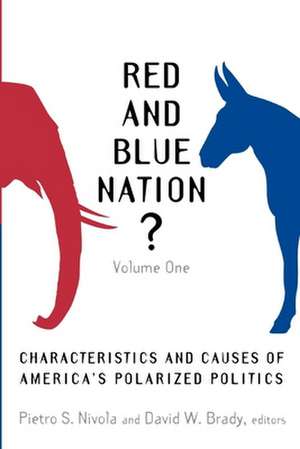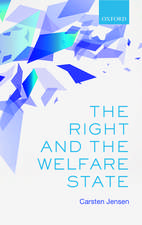Red and Blue Nation?: Characteristics and Causes of America's Polarized Politics
Editat de Pietro S. Nivola, David W. Bradyen Limba Engleză Paperback – 7 dec 2006
Analysts and pundits increasingly perceive a widening gulf between "red states" and "blue states." Yet the research to support that perception is scattered and sometimes difficult to parse. America's polarized politics, it is said, poses fundamental dangers for democratic and accountable government. Heightened partisanship is thought to degrade deliberation in Congress and threaten the integrity of other institutions, from the courts to the media. But, how deep do the country's political divisions actually run? Are they truly wreaking havoc upon the social fabric? Has America become a house divided? This important new book, Red and Blue Nation?, gets to the bottom of this perplexing issue. The first of two volumes cosponsored by Brookings and the Hoover Institution carefully considers the extent to which polarized views among political leaders and activists are reflected in the population at large. It pays particular attention to factors such as the increased influence of religion and the changing nature of the media. The authors show that while the severity of the country's "culture wars" is often overstated, significant fissures have opened. In Red and Blue Nation? leading journalists and scholars combine their different insights to enrich our understanding of the issue, offering thoughtful analyses of the underlying problems. This comprehensive and accessible discussion of the polarization debate will be an essential resource for policymakers, scholars, and anyone interested in the health of American public discourse. Contributors include Alan I. Abramowitz (Emory University), David W. Brady (Hoover Institution), Peter Beinart (The New Republic), Sarah A. Binder (Brookings Institution), James Campbell (State University of New York at Buffalo), Carl Cannon (National Journal), E.J. Dionne, Jr. (Brookings Institution), Gregg Easterbrook (Brookings Institution), Thomas B. Edsall (Washington Post), Morris P. Fiorina (Hoover Institution), William A. Galston (Brookings Institution), Hahrie C. Han (Wellesley College), Gary C. Jacobson (University of California, San Diego), Andrew Kohut (Pew Research Center for The People & The Press), Matthew Levendusky (Stanford University), Thomas E. Mann (Brookings Institution), Diana C. Mutz (University of Pennsylvania), Pietro S. Nivola (Brookings Institution), Tom Rosenstiel (Project for Excellence in Journalism), and Alan Wolfe (Boston College).
| Toate formatele și edițiile | Preț | Express |
|---|---|---|
| Paperback (2) | 233.80 lei 6-8 săpt. | |
| Brookings Institution Press – 7 dec 2006 | 233.80 lei 6-8 săpt. | |
| Brookings Institution Press – 14 ian 2008 | 256.66 lei 6-8 săpt. |
Preț: 233.80 lei
Nou
Puncte Express: 351
Preț estimativ în valută:
44.74€ • 46.54$ • 36.94£
44.74€ • 46.54$ • 36.94£
Carte tipărită la comandă
Livrare economică 14-28 aprilie
Preluare comenzi: 021 569.72.76
Specificații
ISBN-13: 9780815760832
ISBN-10: 0815760833
Pagini: 317
Dimensiuni: 152 x 229 x 22 mm
Greutate: 0.47 kg
Editura: Brookings Institution Press
Colecția Brookings Institution Press
ISBN-10: 0815760833
Pagini: 317
Dimensiuni: 152 x 229 x 22 mm
Greutate: 0.47 kg
Editura: Brookings Institution Press
Colecția Brookings Institution Press
Notă biografică
Pietro S. Nivola is a vice president of the Brookings Institution, where he is the director of Governance Studies. Among his previous books are Tense Commandments: Federal Prescriptions and City Problems (Brookings, 2002) and Agenda for the Nation, coedited with Henry J. Aaron and James M. Lindsay (Brookings, 2003). David W. Brady is deputy director and senior fellow at the Hoover Institution; the Bowen H. and Janice Arthur McCoy Professor at the Stanford Graduate School of Business; and professor of political science in Stanford University's School of Humanities and Sciences. Among his previous books is Revolving Gridlock: Politics and Policy from Jimmy Carter to George W. Bush, coauthored with Craig Volden (Westview, 2005).
Descriere
A Brookings Institution Press and the Hoover Institution publication
Analysts and pundits increasingly perceive a widening gulf between "red states" and "blue states." Yet the research to support that perception is scattered and sometimes difficult to parse. America's polarized politics, it is said, poses fundamental dangers for democratic and accountable government. Heightened partisanship is thought to degrade deliberation in Congress and threaten the integrity of other institutions, from the courts to the media. But, how deep do the country's political divisions actually run? Are they truly wreaking havoc upon the social fabric? Has America become a house divided? This important new book, Red and Blue Nation?, gets to the bottom of this perplexing issue.
The first of two volumes cosponsored by Brookings and the Hoover Institution carefully considers the extent to which polarized views among political leaders and activists are reflected in the population at large. It pays particular attention to factors such as the increased influence of religion and the changing nature of the media. The authors show that while the severity of the country's "culture wars" is often overstated, significant fissures have opened. In Red and Blue Nation? leading journalists and scholars combine their different insights to enrich our understanding of the issue, offering thoughtful analyses of the underlying problems. This comprehensive and accessible discussion of the polarization debate will be an essential resource for policymakers, scholars, and anyone interested in the health of American public discourse.
Contributors include Alan I. Abramowitz (Emory University), David W. Brady (Hoover Institution), Peter Beinart (The New Republic), Sarah A. Binder (Brookings Institution), James Campbell (State University of New York at Buffalo), Carl Cannon (National Journal), E.J. Dionne, Jr. (Brookings Institution), Gregg Easterbrook (Brookings Institution), Thomas B. Edsall (Washington Post), Morris P. Fiorina (Hoover Institution), William A. Galston
Analysts and pundits increasingly perceive a widening gulf between "red states" and "blue states." Yet the research to support that perception is scattered and sometimes difficult to parse. America's polarized politics, it is said, poses fundamental dangers for democratic and accountable government. Heightened partisanship is thought to degrade deliberation in Congress and threaten the integrity of other institutions, from the courts to the media. But, how deep do the country's political divisions actually run? Are they truly wreaking havoc upon the social fabric? Has America become a house divided? This important new book, Red and Blue Nation?, gets to the bottom of this perplexing issue.
The first of two volumes cosponsored by Brookings and the Hoover Institution carefully considers the extent to which polarized views among political leaders and activists are reflected in the population at large. It pays particular attention to factors such as the increased influence of religion and the changing nature of the media. The authors show that while the severity of the country's "culture wars" is often overstated, significant fissures have opened. In Red and Blue Nation? leading journalists and scholars combine their different insights to enrich our understanding of the issue, offering thoughtful analyses of the underlying problems. This comprehensive and accessible discussion of the polarization debate will be an essential resource for policymakers, scholars, and anyone interested in the health of American public discourse.
Contributors include Alan I. Abramowitz (Emory University), David W. Brady (Hoover Institution), Peter Beinart (The New Republic), Sarah A. Binder (Brookings Institution), James Campbell (State University of New York at Buffalo), Carl Cannon (National Journal), E.J. Dionne, Jr. (Brookings Institution), Gregg Easterbrook (Brookings Institution), Thomas B. Edsall (Washington Post), Morris P. Fiorina (Hoover Institution), William A. Galston












